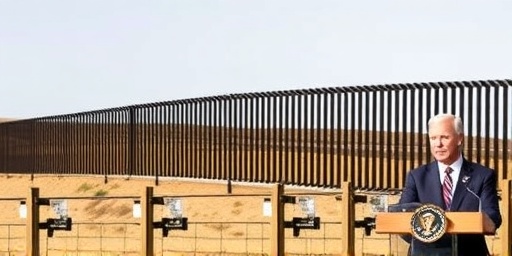In a bold escalation of the long-simmering feud over border security, the Biden administration’s Department of Justice has filed a high-stakes lawsuit against the state of Texas, accusing it of overstepping federal authority with its ambitious border wall expansion plans. The legal action, announced late yesterday, targets Texas Governor Greg Abbott’s aggressive push to fortify the Texas border amid rising debates on immigration. This move comes just months before a pivotal election cycle, intensifying accusations of political maneuvering from both sides.
- DOJ’s Core Allegations: Federal Supremacy in Immigration Control
- Abbott’s X Outburst: Labeling the Suit as Election Interference
- Texas’ Border Wall Surge: From Vision to Concrete Reality
- National Backlash: Dividing Lines in the Immigration Debate
- Legal Showdown Ahead: Potential Rulings and Policy Shifts
DOJ’s Core Allegations: Federal Supremacy in Immigration Control
The Biden administration’s complaint, lodged in the U.S. District Court for the Western District of Texas, argues that Texas’ unilateral expansion of its state-funded border wall infringes on the federal government’s exclusive domain over immigration enforcement. According to the 45-page filing, Texas’ Operation Lone Star initiative, which has already seen over 100 miles of new barriers erected since 2021, disrupts federal operations along the Rio Grande and violates the Supremacy Clause of the U.S. Constitution.
Key to the lawsuit are claims that Texas’ barriers have impeded U.S. Customs and Border Protection (CBP) agents from accessing critical riverfront areas, potentially endangering lives during crossings. ‘The state cannot usurp the role of the federal government in managing our nation’s borders,’ stated DOJ spokesperson Kristen Clarke in a press briefing. ‘This expansion not only contravenes established law but also complicates our humanitarian efforts to process migrants humanely.’
Supporting evidence cited in the suit includes satellite imagery showing Texas’ razor-wire fencing and concrete barriers blocking traditional patrol routes. Statistics from CBP reveal a 25% drop in federal apprehensions in affected sectors since the expansions began, which the DOJ attributes to logistical chaos rather than improved security. The filing also references a 2023 Supreme Court ruling in United States v. Texas, where the court affirmed federal primacy in immigration matters, setting a precedent that the Biden team is now leveraging aggressively.
Legal experts like Harvard Law professor Laurence Tribe have weighed in, calling the lawsuit a ‘necessary corrective’ to states’ rights overreach. ‘Texas is essentially building a parallel immigration system,’ Tribe told reporters. ‘This challenges the foundational balance of power in our federalist structure.’
Abbott’s X Outburst: Labeling the Suit as Election Interference
Texas Governor Greg Abbott wasted no time in counterpunching, taking to X (formerly Twitter) to denounce the Biden lawsuit as blatant election interference. In a thread that garnered over 500,000 views within hours, Abbott wrote: ‘The Biden Admin is suing Texas for protecting our state from an immigration invasion. This is nothing but a desperate attempt to meddle in elections by silencing border states. We won’t back down!’
Abbott’s rhetoric taps into a narrative he’s championed since 2021, framing Texas’ actions as a bulwark against what he calls the Biden administration’s ‘open border policies.’ His post included photos of National Guard troops installing new wall segments near Eagle Pass, a hotspot for migrant crossings. ‘While Biden sues us, cartels run rampant. Who’s really interfering?’ he added, linking to a video of a recent border incident involving alleged smuggling.
The governor’s response has mobilized his base, with Texas Republicans rallying in support. State Attorney General Ken Paxton, who will lead the defense, echoed Abbott on X: ‘This lawsuit is political theater from a failing Biden White House. Texas law demands we secure our Texas border—and we will.’ Paxton’s office has already filed a motion to dismiss, arguing that the state is exercising its sovereign right to protect public safety under the 10th Amendment.
Social media erupted in the wake of Abbott’s post, with hashtags like #StandWithTexas and #BidenBorderCrisis trending nationwide. Conservative influencers, including former Fox News host Tucker Carlson, amplified the message, accusing the Biden administration of prioritizing lawsuits over security. On the flip side, immigrant rights groups like the ACLU condemned Abbott’s stance, with executive director Anthony Romero stating, ‘Governor Abbott’s fearmongering ignores the human cost of these barriers, which have led to at least 20 migrant deaths this year alone.’
Texas’ Border Wall Surge: From Vision to Concrete Reality
Texas’ border wall expansion is the cornerstone of Operation Lone Star, a $4.5 billion program launched by Governor Abbott in March 2021 as a direct rebuke to perceived federal inaction on immigration. To date, the state has constructed 128 miles of new barriers, with plans to add another 200 miles by 2025, focusing on high-traffic areas like the Rio Grande Valley and Big Bend regions.
The initiative employs a mix of Texas National Guard troops, state troopers, and private contractors, funded largely through redirected highway maintenance budgets—a move that drew its own legal challenges from environmental groups. Proponents point to a 40% reduction in illegal crossings in walled sectors, per Texas Department of Public Safety data, though critics argue these figures are inflated and don’t account for migrants rerouting to more dangerous terrains.
One striking example is the 34-mile stretch near Del Rio, completed in late 2023, which features 18-foot steel panels topped with anti-climb plating. Local rancher Maria Gonzalez, whose property abuts the wall, shared her mixed feelings in an interview: ‘It’s cut down on trespassers, but the flooding last spring trapped my cattle against it. Security comes at a cost.’ Environmental impacts are another flashpoint; the Sierra Club has documented habitat disruption for endangered species like the ocelot, filing amicus briefs in support of the federal lawsuit.
Economically, the project has injected millions into border communities, creating over 1,200 jobs in construction and surveillance. Yet, a 2024 University of Texas study estimates long-term maintenance costs could exceed $1 billion annually, raising questions about fiscal sustainability. Abbott defends the investment, stating in a recent op-ed, ‘The Texas border is our frontline against fentanyl and human trafficking—federal immigration failures demand state action.’
National Backlash: Dividing Lines in the Immigration Debate
The lawsuit has ignited a firestorm across the political spectrum, underscoring deep divisions on immigration policy. In Washington, D.C., Senate Minority Leader Mitch McConnell praised Texas’ efforts, tweeting: ‘Biden’s lawsuit punishes states for filling the void left by his lax borders. Time for real reform.’ Conversely, House Speaker Nancy Pelosi called the suit ‘a vital defense of federal authority,’ urging Congress to bolster CBP funding.
Public opinion polls reflect the split: A recent Pew Research survey shows 62% of Republicans support state-led border measures, compared to just 28% of Democrats. Border states like Arizona and New Mexico have watched warily; Arizona Governor Katie Hobbs, a Democrat, expressed sympathy for Texas’ security concerns but stopped short of endorsing the wall, saying, ‘We need collaborative solutions, not litigation.’
Humanitarian organizations have amplified voices from the ground. The Texas Civil Rights Project reported a spike in family separations due to the barriers, with over 5,000 unaccompanied minors intercepted in the past year. ‘These walls don’t stop migration; they amplify suffering,’ said director Rochelle Garza. On the enforcement side, Border Patrol union president Brandon Judd defended federal agents, noting in testimony before Congress that state actions have led to ‘dangerous standoffs’ between local and federal personnel.
The controversy also intersects with broader immigration trends. U.S. Customs and Border Protection logged over 2.4 million encounters at the southwest border in fiscal year 2023, a record high attributed to global instability and economic pull factors. The Biden administration’s parole programs for Afghans, Ukrainians, and Venezuelans have drawn fire from critics like Abbott, who claims they incentivize illegal entries. In response, White House Press Secretary Karine Jean-Pierre reiterated, ‘Our approach balances security with compassion—Texas’ rogue actions undermine that.’
Legal Showdown Ahead: Potential Rulings and Policy Shifts
As the lawsuit progresses, both sides are gearing up for a protracted battle that could reshape immigration enforcement. The case is assigned to Judge David Ezra, a George W. Bush appointee known for balanced rulings on border issues. A preliminary injunction hearing is scheduled for next month, where Texas will argue that its barriers complement, rather than conflict with, federal efforts.
If the DOJ prevails, it could halt further expansions and mandate barrier removals, forcing Texas to redirect funds elsewhere. Legal analysts predict a possible appeal to the Fifth Circuit Court of Appeals, which has a conservative lean and previously sided with states in similar disputes. Supreme Court involvement isn’t out of the question, given the constitutional stakes.
Politically, the timing amplifies tensions ahead of the 2024 elections. Abbott, eyeing a potential presidential run, has used the Texas border crisis to burnish his tough-on-crime image, while the Biden team aims to neutralize Republican attacks on border security. Bipartisan immigration reform remains elusive; stalled Senate bills like the 2024 border security package highlight gridlock.
Looking forward, experts foresee ripple effects. A Texas win might embolden other states to pursue independent measures, fragmenting national policy. Conversely, a federal victory could streamline operations but strain relations with red states. Advocacy groups on all sides are mobilizing: the Federation for American Immigration Reform plans rallies in support of Texas, while RAICES prepares legal aid for affected migrants. As the Texas border remains a tinderbox, this lawsuit may well define the next chapter in America’s immigration saga, pushing policymakers toward urgent, if uncomfortable, compromises.








